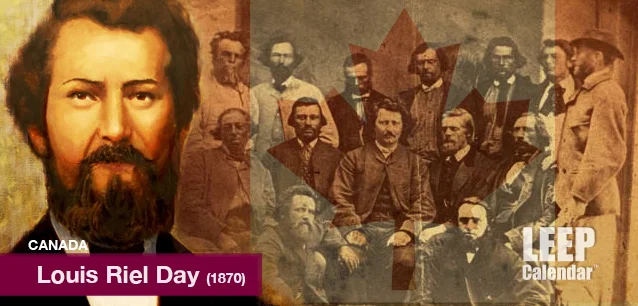 AD
AD
Today is: November 23
Scroll to explore events active on this date.
LEEP INK FEATURES

August is Appropos
A toddler playing in the fountain at a park in Santa Fe, New Mexico—Photo LD Lewis. In August, we live through the Dog Days of Summer. It's hot and often humid, and those ...

September is Sassy
Can you hear that sigh of relief from parents worldwide? Yes! September marks the return of students to school, a global phenomenon. Preparations for the ACT and SATs begin earnestly for ...

OOH LA LA, October
October is the busiest month for events, with 5% more happening than in May, the second most eventful month. Sailing enthusiasts will be glued to the finals of this year's Am...
About Louis Riel Day in Canada
Military , Civil Rights
Legal , Canada
Ends: Feb 17, 2025
DESCRIPTION:
How do you describe Louis Riel to someone from the United States? It can be challenging. Riel was a little Davy Crocket, a dollop of William Penn, a pinch of Jesse James with a smattering of Nathanael Greene, all wrapped around the heart of Fredrick Douglas. He's considered a hero to many and a scoundrel to others. In Canada, Louis Riel Day commemorates the man and the events of February 17, 1870, which led to the founding of Manitoba.
Riel was born in 1844 and led two resistance movements against the Canadian government to preserve the human rights, culture, and lands of the native Métis people, ultimately through the establishment of Manitoba. Here's how it came into being.
The Red River Rebellion of fall/winter 1869-1870 sought to safeguard First Nations rights as the region transferred from the Hudson Bay Company into the hands of the Canadian confederation government. Riel was elected the provisional governor of the Métis people and negotiated on their behalf. Most French and Anglo settlers agreed to work with the First Nation peoples through the negotiations. However, the Canadian Party, a small rebel faction, objected to considerations. The party took up arms against Reil, the talks, and the provisional government. It sought to remove each in a series of skirmishes and avoid a settlement with the First Nations.
On February 17, 1870, the rebellion ended as forty-eight Canadian Party militants were arrested near Fort Garry. Among those detained was Thomas Scott, who Riel directed the Métis to execute by the firing squad on March 4. Scott's execution prompted the talks creating the Manitoba Act, which went into force on May 12, 1870. However, his execution caused the Protestant Canadians to band together against the provisional government and its leader, forcing Riel to seek asylum in the United States. He spent the next decade bouncing back and forth over the border. Riel served in the Canadian Parliament for four months during his bouncing days, from October 1873 to January 1874.
Ultimately, like the US government's dealings with Native Americans, the Canadian government didn't uphold its bargain with the Métis and First Nation people, leading to another rebellion, the North-West Rebellion. The loss of wild bison hunted to near extinction in the US, and Canadian territories contributed to the urgency. Reil led this uprising against the Canadian confederacy, was captured in the Battle of Batoche, and later executed on November 16, 1885, at age 41 for treason.
In 2008 the Canadian government made Louis Riel Day an official holiday. Currently, it falls the same day as Family Day, a national holiday in Canada, except in British Columbia, which celebrates Family Day a week earlier, so Riel gets his day, and BCers get two Mondays off.
VIDEOS
SUPPORTING DOCUMENTS
Currently, this event does not have supporting documents.
ADDITIONAL IMAGES
Currently, this event does not have supporting images.
Where would you like to go now?
 AD
AD


/footer-logo.svg)
